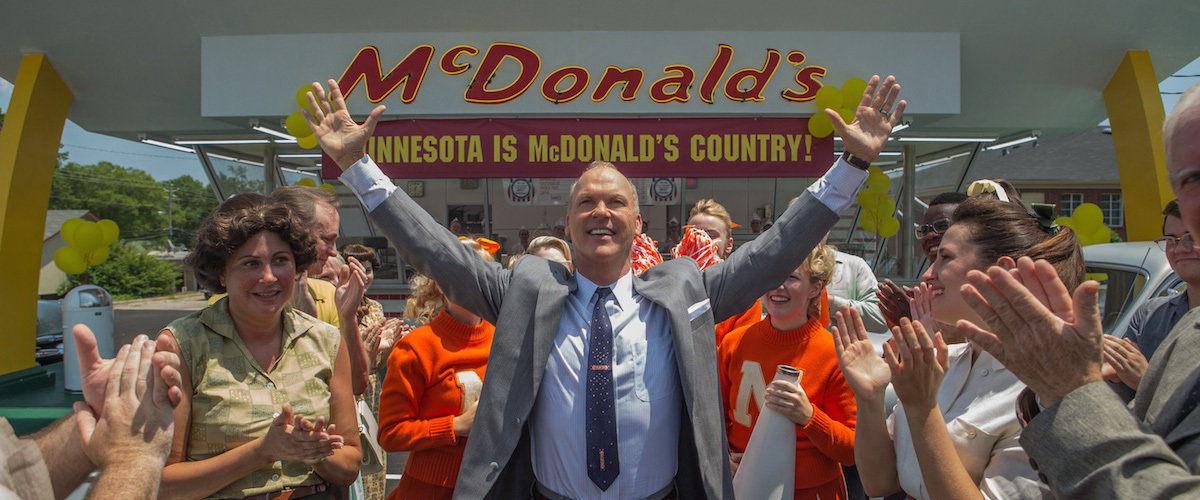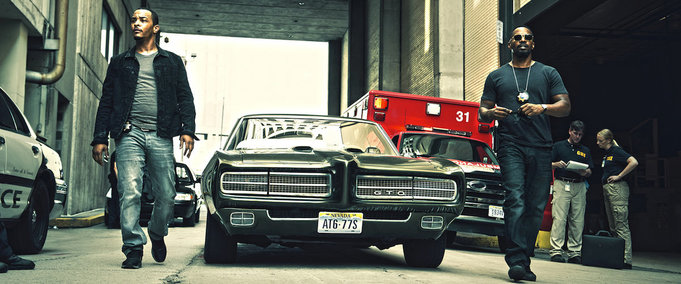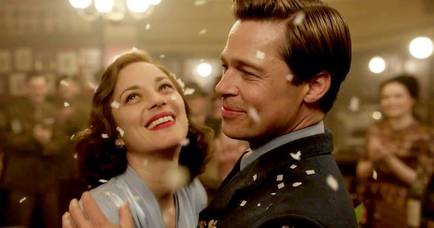|
"Gold" is the latest in a subgenre of films that seems to think that the sight of men moving gigantic amounts of money around electronically—and sometimes just stealing it, or having it stolen from them—is innately fascinating. Matthew McConaughey stars as Kenny Wells, who is continuing in the family business carved out by his dad (Craig T. Nelson, glimpsed briefly in flashbacks). The movie repeatedly refers to their ilk as "miners," and they see themselves that way, with pride. But while this film by writer-director Stephen Gaghan ("Syriana") does show Kenny and various allies and rivals traveling to foreign countries and searching treacherous terrain for veins of metal, there's not much pick-axe swinging, bulldozing or blasting to be seen. These self-described miners are more likely to be seen yelling into phones about money, staring anxiously at TV reports about stock prices because they're worried about money, or flying to other states or countries to find out what happened to their money.
The tale is a true one, based on a magazine story, though of course many details have been changed or embellished. Kenny is presented as a down-on-his-luck hustler, practically begging for the money he needs to get back into the precious metals game. He's is the second modern gloss on a Willy Loman/"Death of a Salesman" type to appear in a major film this month—the other is McDonald's mastermind Ray Kroc in "The Founder," a less ambitious but altogether more satisfying drama. Like the McDonald's film, though, "Gold" often can't seem to make up its mind to be disgusted and embarrassed by its hero's naked greed and the seeming moral vacuum at his heart, or get swept up in his adrenaline rush as he scampers from state to state and to South America and back, looking for the big strike that'll make him a big shot. Read more
1 Comment
“The Founder” is mesmerized by its hero, McDonald’s chain founder Ray Kroc (Michael Keaton), but horrified by how he built his empire. That kind of ambivalence is great; in fact it’s a hallmark of good drama. But there are too many moments when “The Founder” becomes a business-drama variant of that war film problem identified by Francois Truffaut: it’s hard to make a truly anti-war film because war is inherently cinematic, and when you show it, people get swept up in the action anyway.
The bloodshed in the business drama is (usually) figurative, but the conflict is still thrilling, and so a lot of films about business end up grappling with Truffaut's war movie problem. “Glengarry Glen Ross,” “Wall Street,” “Wolf of Wall Street,” “Boiler Room” and the like are filled with the kinds of people you'd cross a room to avoid, yet you hear their lines quoted by businesspeople and b-school students as inspirational texts, probably because it's more fun to identify with the bastard who gets things done than the people who suffer from his actions. Ray Kroc is a local Chamber of Commerce version of Gordon Gekko. Keaton plays him with such laser-beam focus that even when the movie is appalled by Ray's shady maneuvers, it still leans on his every word. Read more "Sleepless" is one of those movies that needed to be a lot better or a lot worse to make much of an impression. This story of a Las Vegas police officer trying to recover his kidnapped son from bad guys is frustratingly not-terrible. The action sequences, the characterizations, the performances, all could have come together to form a dandy example of what used to be a called a B-movie: a genre film that doesn't have much money to play with but compensates with ingenuity and style. And yet "Sleepless" somehow quite never gets to that level. Its rare moments of quality only make the rest of the movie—a mishmash of conspiratorial plotting and close-quarters fistfights and gunfights—seem lamer. As directed by Baran bo Odar (2010's "The Silence") and scripted by "World Trade Center" writer Andrea Berloff, this remake of the 2011 French film "Sleepless Night" is funny sometimes but not funny enough, exciting sometimes but never exciting enough, and inherently emotional (mainly due to the hero's anguished desire to save his son) yet never willing to run with the emotionalism and turn into a full-blown action melodrama.
Sticking closely to the French original, "Sleepless" starts in the middle of a car chase, with Las Vegas police detective Vincent Downs (Jamie Foxx) and his partner Sean Cass (T.I.) stealing a massive shipment of cocaine from drug dealers working for local crime boss Rob Novak (Scoot McNairy), who supplies a local hotel and casino owner named Stanley Rubino (Dermot Mulroney) with party favors for his high-rolling guests. The bad guys kidnap Vincent's son Thomas (Octavius J. Johnson) to get the drugs back. Read more Editor's Note: Molly Haskell has one of the most essential voices in the history of film criticism. Whether it's her groundbreaking writing at The Village Voice or New York Magazine or her influential book From Reverence to Rape: The Treatment of Women in the Movies, her work changed the way we look at film and how we write criticism. She was kind enough to discuss her career with us late last year. She has a new book out, Steven Spielberg: A Life in Films. She has also re-issued From Reverence to Rape in a new edition, with an introduction by New York Times film critic Manohla Dargis.
MZS: One of the things that fascinates me about From Reverence to Rape is that, in addition to being about what it’s about—the image and treatment of women throughout movie history—the book is also about what’s shown and what’s withheld, what’s said and what’s unspoken, and what effect that all has on the viewer. At times it seems as if you think that a bit of repression can be good for movies. MH: I do. Well … it’s really plus and minus. Last night I was watching "North by Northwest" and I thought, “That can’t be done anymore.” They can’t make films that have that kind of subtext, and I guess it’s because we don’t have the veneer of normalcy that that sort of movie depends on, or the veneer of oppression and everything else. But those scenes with Cary Grant and Eva Marie Saint are so erotic, and also when he’s hating her. Do you remember the film? Vividly. OK, so after he’s almost been killed by the crop duster and he comes to her room, and he doesn’t tell her that he knows she’s behind it, it’s all there. But it’s—so full of hate and the hate is so close to eros that it’s just indistinguishable! So amazing! I don’t think there’s anything like that today. I did a Q&A with Ed Sorel, who’s done this book on Mary Astor, with his cartoon drawings and everything, it’s just fabulous. Well, we were talking about “Dodsworth” and how sophisticated it is. It’s such an adult movie, because you know Ruth Chatterton is having affairs with all these people, but the movie doesn’t spell it all out. You see her go to her room, and you know it. And people were amazed by that because they knew how strong the Production Code was at that time in the Hays Office. Read more ** S P O I L E R S ****
"Can you even see me?" The French resistance fighter Marianne Beausejour (Marion Cotillard) asks that question of Canadian intelligence officer Max Vatan (Brad Pitt) in the opening section of the World War II thriller "Allied." The two are in German-dominated, Vichy-controlled Casablanca, pretending to be husband and wife in the presence of Nazis that they'll eventually kill in cold blood for the greater good of the Allied cause. She's responding to Max telling her that she looks beautiful—not once, but twice. She appreciates the compliment, but she needs to know, is he really seeing her? Good question. What does "her" or "him" even mean in a film like this one? "Allied" is built around two impossibly good-looking people who live their professional lives as blank slates, secret agents who might or might not be sincere or faking it at any given moment, and whose every tiny gesture might hide an agenda hidden inside yet another agenda. At that point in the story, it seems as if Max really is seeing Marianne. After an initial dance of detachment, which sees the two chastely pretending to reignite a physical relationship interrupted by the husband's international travel, they've started sleeping together, disregarding the tradecraft rule that agents pretending to be lovers should never actually become lovers. "Can you even see me?" she asks. "Not really," he says. Read more |
Matt Zoller SeitzFilm critic and filmmaker. Archives
April 2017
Categories
All
|






 RSS Feed
RSS Feed